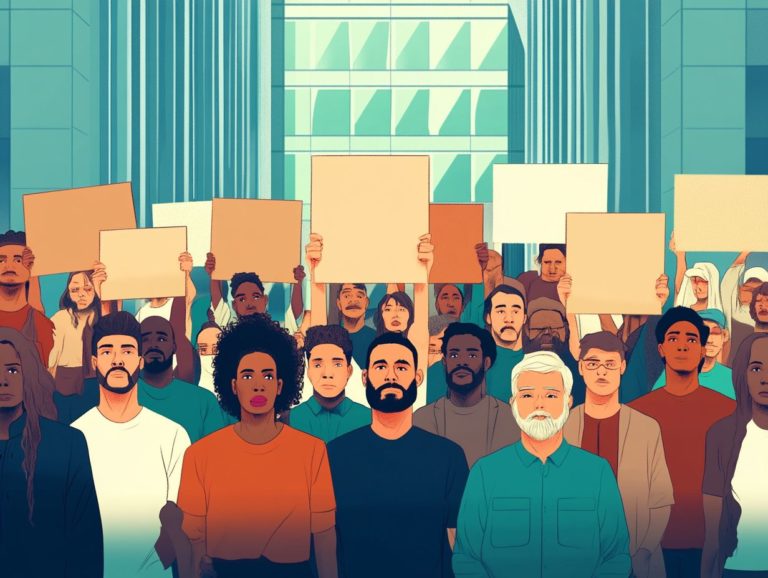What Are Your Rights During Interrogation?
Know your rights during an interrogation! They can make a huge difference if you’re ever in a tough spot.
This article delves into the intricacies of interrogation rights, highlighting their importance and the protection they offer. It covers Miranda Rights legal protections that law enforcement must inform you about during questioning along with your specific rights during an interrogation, such as the right to remain silent and the right to have an attorney present.
It also outlines the steps to take if you suspect your rights have been infringed upon. Being well-informed about these rights empowers you and ensures that you are treated fairly within the justice system.
Contents
- Key Takeaways:
- Understanding Interrogation Rights
- Miranda Rights
- Your Rights During Interrogation
- What to Do if Your Rights Are Violated
- Frequently Asked Questions
- What Are My Rights During Interrogation?
- Can I Refuse to Answer Questions During Interrogation?
- Do I Have to Speak with the Police During Interrogation?
- What Happens if I Waive My Right to an Attorney During Interrogation?
- What Should I Do if I Feel My Rights are Being Violated During Interrogation?
- Do My Rights During Interrogation Apply to All Cases?
Key Takeaways:

Here s what you need to remember to stay protected:
- Exercise your right to remain silent during interrogation. Anything you say can be used against you in court, so it’s important to speak with an attorney first.
- You have the right to an attorney during interrogation. If you cannot afford one, the court will appoint one for you. This helps protect your rights and ensures a fair process.
- You can say no if law enforcement wants to search your things. Know your rights and exercise them if needed.
Understanding Interrogation Rights
Understanding your interrogation rights is essential because they serve as the foundation of your legal protections during interactions with law enforcement.
These rights are grounded in pivotal legal precedents, such as Miranda v. Arizona, which delineates what you need to know when engaging with police officers.
Being informed about your rights enables you to navigate the legal landscape confidently and ensures your constitutional protections are honored regardless of whether you are a citizen or a non-citizen facing scrutiny from law enforcement.
What are Interrogation Rights?
Interrogation rights encompass the legal safeguards you possess during police questioning, notably your right to remain silent and your right to consult with a defense attorney. These essential rights are embedded in the Fifth Amendment of the U.S. Constitution, which protects you against self-incrimination.
During a custodial interrogation, law enforcement is obligated to inform you of your rights, commonly known as Miranda rights, ensuring you understand your ability to remain silent and request legal counsel.
If you ever feel pressured or bewildered during questioning, you can choose to invoke these rights. Doing so can profoundly impact the trajectory of your case. Neglecting to uphold these protections can lead to involuntary confessions and a compromised sense of justice.
Why are they Important?
Understanding your interrogation rights is crucial for safeguarding yourself during any legal process, as these rights can significantly influence the outcome of a criminal prosecution.
These provisions prevent you from being coerced into making confessions that could result in unjust penalties, acting as a bulwark against potential abuses of power by law enforcement.
In high-stakes criminal defense cases, exercising these rights can be pivotal. When you invoke your right to remain silent, you often position yourself more favorably to construct a strong defense.
Neglecting to assert these rights can lead to dire consequences, including wrongful convictions or harsh penalties. You may inadvertently provide damaging admissions without fully grasping the implications of your words.
Miranda Rights
Miranda Rights represent a crucial set of legal protections that law enforcement is obligated to communicate to individuals during custodial interrogation. This ensures that you are fully aware of your constitutional rights as outlined in the Fifth Amendment.
What are Miranda Rights?

Miranda Rights inform you of your legal rights, including your right to remain silent and your right to an attorney during police questioning.
These rights help protect you from self-incrimination. They ensure you understand your legal standing when facing interrogation.
Established from the landmark Supreme Court case Miranda v. Arizona, these rights highlight the necessity for a defendant to grasp the implications of conversing with law enforcement without legal counsel present.
By invoking these rights, you can ward off potential coercion or misunderstandings, helping create a fair justice system that honors the principles of the Fifth Amendment.
Understanding your Miranda Rights is crucial, as they play a vital role in determining the outcome of any police encounter you might experience.
When are they Read?
Miranda Rights come into play when you find yourself in a custodial interrogation, which means being questioned by police in a way that you cannot leave. This legal requirement traces back to the landmark 1966 Supreme Court case *Miranda v. Arizona*.
This includes your right to remain silent and your right to an attorney, ensuring you can make informed decisions about whether to participate in the interrogation.
It s crucial to understand that these rights only apply when you are formally in custody, meaning you re not free to go and are facing direct interrogation by law enforcement.
There are exceptions; if you are simply detained without any questioning, the police may not be required to issue Miranda warnings. Grasping these nuances is vital for both law enforcement and individuals, ensuring the protection of constitutional rights.
Your Rights During Interrogation
During interrogation, you hold fundamental rights that are essential to safeguarding your legal standing. These rights include the right to remain silent, the right to an attorney, and the right to refuse a search.
Understanding and using these rights ensures that you are protected throughout the process.
The Right to Remain Silent
The right to remain silent is a vital protection under the Fifth Amendment, enabling you to avoid self-incrimination during police questioning.
This essential legal safeguard allows you to withhold information that could unintentionally lead to your prosecution.
When you invoke this right, law enforcement must honor your decision, ceasing further questioning unless you choose to waive your right.
Neglecting to exercise this right can have serious repercussions; any statements you make can be used against you in court, potentially resulting in a conviction based on self-incriminating evidence.
Picture this: you re chatting casually with the police, unaware that your words could seal your fate in court. Such scenarios highlight the critical importance of understanding your right to remain silent.
The Right to an Attorney
The right to an attorney guarantees that you have access to legal representation during police interrogations, allowing you to navigate the often convoluted legal landscape with confidence. This protection is absolutely essential!
When questions become intense or muddled, having a legal expert by your side can clarify the situation, signaling to the interrogators that you are fully aware of your rights.
In cases of wrongful accusations or during high-stakes investigations, the presence of a defense attorney is even more vital.
They provide immediate guidance on how to respond appropriately while carefully evaluating each question to ensure you re not inadvertently incriminating yourself.
This strategy not only boosts your defense but also creates a fairer interrogation process.
The Right to Refuse a Search

The right to refuse a search is a legal safeguard provided by the Fourth Amendment. This ensures that law enforcement cannot enter your property without your consent or probable cause.
This essential protection lets you keep your autonomy during police encounters. During interrogations, the pressure to agree can feel immense. By asserting this right, you protect yourself from unreasonable invasions of privacy that could lead to unjust consequences.
Consider a scenario where officers ask for permission to search your vehicle. Knowing the implications of declining this request can ease a potentially tense moment. It also protects you from the collection of any illegal evidence.
The ability to refuse searches reinforces the principle that you shouldn’t face unwarranted scrutiny. It fosters a sense of dignity and respect in your interactions with law enforcement.
What to Do if Your Rights Are Violated
If your rights are violated during police questioning or formal questioning by police, taking decisive steps is essential. Protect your legal rights and hold law enforcement accountable for their actions.
Steps to Take
If you suspect that your rights have been violated, document the incident meticulously. Then, seek legal advice from a qualified defense attorney.
Gathering every detail is crucial to your case! Collect dates, times, witnesses, and any other relevant information that could strengthen your case.
Once you have everything documented, reaching out to legal counsel will clarify your situation. An experienced attorney can guide you on filing formal complaints, which are crucial for laying the groundwork for any legal proceedings.
Each step is vital in ensuring your rights are protected. By taking these measures, you safeguard your own rights and contribute to a broader environment where justice prevails.
Importance of Knowing Your Rights
Knowing your rights during police questioning is absolutely essential. It enables you and serves as a shield against unlawful treatment and potential criminal charges.
When you understand your rights like the right to remain silent or the right to an attorney you re better prepared to handle high-pressure moments. For instance, if you’re pulled over during a traffic stop, knowing you can refuse to answer questions without a lawyer present can dramatically change the course of the interaction.
If you feel trapped and unaware of your legal protections, you might inadvertently incriminate yourself. Confidently relying on your rights often leads to dismissals of charges or more favorable plea deals.
This shows just how impactful that knowledge can be during critical encounters with law enforcement.
Frequently Asked Questions
What Are My Rights During Interrogation?

Your rights during interrogation include the right to remain silent, the right to an attorney, and the right to be informed of the charges against you.
Can I Refuse to Answer Questions During Interrogation?
Yes, you have the right to remain silent and can choose not to answer any questions during interrogation. It is best to exercise this right and consult with an attorney before speaking with law enforcement.
Do I Have to Speak with the Police During Interrogation?
No, you are not required to speak with the police during interrogation. You have the right to remain silent and can invoke this right at any time during the interrogation process.
What Happens if I Waive My Right to an Attorney During Interrogation?
If you waive your right to an attorney during interrogation, you choose to speak with law enforcement without legal representation. Remember: anything you say can be used against you in court.
What Should I Do if I Feel My Rights are Being Violated During Interrogation?
If you think your rights are being violated during questioning, you can stop and ask to talk to a lawyer.
You can also file a complaint with the right authorities if you think your rights have been violated. Don t hesitate to take action!
Do My Rights During Interrogation Apply to All Cases?
Yes, your rights during questioning apply to every case, no matter how serious the charges are.
These rights are protected by the Fifth Amendment, which safeguards your rights in the United States.






